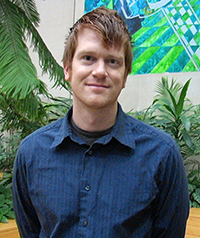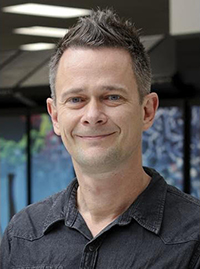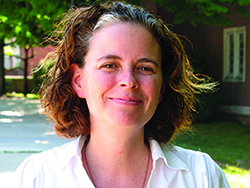Three members of the FRIB user community were named 2018 American Physical Society (APS) Fellows: Scott Bogner, Gaute Hagen, and Kate Jones.
APS is a nonprofit membership organization that works to advance and spread knowledge of physics via publications, meetings, activities, and more. Fellows are selected for their outstanding contributions to physics. Each year, the number of APS fellows elected is no more than one half of one percent of the membership.
Scott Bogner

Bogner was elected by APS for “the development and application of renormalization group methods to low-energy nuclear physics, including the similarity renormalization group and the in-medium similarity renormalization group as a new ab initio method.”
“My research uses quantum mechanics to describe the behavior of nuclei starting from the microscopic forces between the constituent nucleons (i.e., protons and neutrons),” said Bogner.
Bogner earned his
“When I look at the list of the APS fellows in nuclear physics, I’m struck by the consistently high caliber of research across the board. I’m flattered that the selection committee deemed my research contributions, which I should stress were collective efforts with many outstanding collaborators, to be worthy of this honor,” said Bogner.
Gaute Hagen

Gaute Hagen is a Research and Development staff member at Oak Ridge National Laboratory (ORNL).
Hagen was elected by APS for “contributions to the development of coupled-cluster methods in nuclear physics and his theoretical predictions for the structure of rare isotopes.”
ORNL describes this research as a “focus on computational and theoretical advances in ab initio approaches for atomic nuclei with the goal of understanding the structure and decays of nuclei and the physics of matter at the extremes of the nuclear landscape.”
Hagen received his
“It made me happy that the work our group has been doing over the last decade or so in describing the atomic nucleus from
Kate Jones
 Kate Jones is a professor of experimental nuclear physics at the University of Tennessee, Knoxville. She was elected as a Fellow for her “important contributions to understanding the structure of neutron-rich and weakly bound nuclei, in particular from neutron transfer reactions with radioactive 132Sn beams.”
Kate Jones is a professor of experimental nuclear physics at the University of Tennessee, Knoxville. She was elected as a Fellow for her “important contributions to understanding the structure of neutron-rich and weakly bound nuclei, in particular from neutron transfer reactions with radioactive 132Sn beams.”
Jones earned a
“I knew I had been nominated, but I hadn’t thought about it in a long time. I was just very happy,” said Jones. “[This] is the culmination of many years of research. To be elected is truly an honor.”
